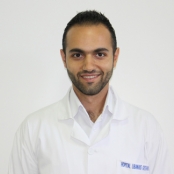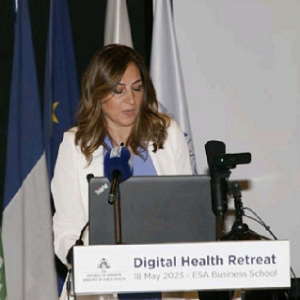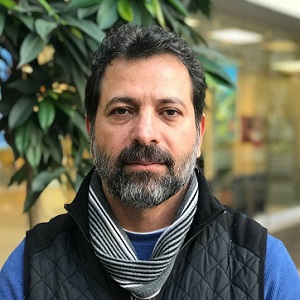
This project is part of a global IDRC-funded initiative on AI for Global Health
https://idrc-crdi.ca/en/initiative/artificial-intelligence-global-health
strEngthening pandeMic survEillance through aRtificial intelliGENce automation of laboraTory data for LEBANON
Project Context
Starting in 2019, Lebanon has been grappling with a severe economic crisis that was further compounded by the COVID -19 pandemic. This combination of factors has led to the deterioration of public infrastructure and limited access to healthcare, exacerbating the resurgence of specific pandemic situations, including recent cases of Cholera. In contrast to the escalating and emerging risks of pandemics, the national surveillance system is facing challenges due to insufficient resources and fragmentation. Moreover, it heavily relies on self-reporting of diseases and lab results by healthcare institutions and laboratories and adopts a conventional epidemiological analysis of data. Unfortunately, this approach suffers from several weaknesses, such as low sensitivity, limited comprehensiveness, data validity issues, and delays in disease detection. The objective of the research project is to enhance Lebanon’s pandemic preparedness by harnessing AI-driven tools directly linked to laboratory data. The aim is to enable swift detection of early trends in high-risk communicable diseases and provide automated interpretation and analysis of disease outbreaks, encompassing Acute Flaccid Paralysis, Cholera, Hepatitis, Hemorrhagic fevers, Food poisoning, Meningitis, COVID-19, and extensively drug-resistant organisms. During the initial phase, the focus will be on collaborating with a university hospital laboratory to develop and validate a prototype of such a system, adhering to the standards set by the Lebanese Ministry of Public Health (MoPH). This endeavor will involve a diverse panel of experts from various fields, including laboratory medicine, microbiology, internal medicine/infectious diseases, medical informatics, and epidemiology. International collaboration will be sought, and an MoPH expert will also be integrated to ensure the evaluation of this solution’s suitability for national implementation.
Research Objectives
The primary aim of this project is to enhance the efficacy of Lebanon’s existing pandemic surveillance system on multiple fronts. This will be achieved through a comprehensive approach, encompassing various aspects:
- Systematizing the detection of infectious pathogens and pathologies that fall under national or regional surveillance. This will involve the direct extraction of data from healthcare institutions’ information systems and laboratory information systems.
- Enhancing the identification of noteworthy patterns in data that warrant expert attention. This will be accomplished by employing automated rules and alerts, which will be carefully validated by subject matter experts.
- Streamlining the amalgamation of information into a centralized real-time dashboard. This platform will facilitate the visualization of crucial epidemiological surveillance data and trends, thus offering superior decision-making support. The initiative will commence with a pilot in one university healthcare institution, during the inception phase, where a fully elaborated system prototype will be rigorously tested and compared against the existing system. Subsequently, a detailed roadmap will be developed for nationwide implementation in collaboration with the Ministry of Public Health (MoPH), paving the way for a Phase 2 proposal.
Project Investigators
The project Principal Investigator is Dr. Elie SOKHN, Assistant Professor of Microbiology at Beirut Arab University, and Head of Microbiology at the Lebanese Hospital Geitaoui-UMC.
Dr. Antoine SAAB, Biomedical Engineer, PhD in Medical Informatics from Sorbonne University in France, and head of the Quality and Patient Safety Department in the Lebanese Hospital Geitaoui-UMC, will be Co-Principal Investigator, and will be responsible for supervising the system conception, implementation and validation phases, and will contribute directly to the project implementation as needed in his knowledge scope.
Dr. Christo EL MORR, Associate Professor of Health Informatics at York University, will be Co-Principal Investigator, will be an organic part of the research team and will supervise the methodology and provide expert advice in health informatics and will supervise the machine learning development. The management of the project and the allocation of funds will be decided by the PI and Co-PIs in mutual agreement.
Dr.Yahya EL-LAHIB (co-Investigator) is an Associate Professor with the Faculty of Social Work, at the University of Calgary. His current research utilizes postcolonial and transnational theories to interrogate the intersection of disability and displacement as they shape the experiences of marginalization of displaced people with disabilities. He is an expert in critical social work encompassing community practice, policy development, and research on education. Dr. El-Lahib will ensure the alignment of the project with Human Rights and Disability rights.
OKHN
Research Team
Dr. Mouin JAMMAL (MD in Internal Medicine and Clinical Immunology) will be leading the efforts relative to the elaboration of the biological and clinical interpretation rules in order to automate the analysis of the system data and define relevant alerts. He will also be responsible for the validation of these rules with a panel of experts in the validation phase of the system.
Mrs. Lina ABU MRAD (MBA in Health Management), based on her expertise and role as National E-Health program director at the Ministry of Public Health (MoPH), will ensure that, by design, the elaborated system would be useful and relevant for use in the MoPH surveillance efforts, and lead the efforts to identify key important factors that can drive the system to be easily incorporated at the national level.
Mrs. Cynthia ABI KHALIL (Nursing Director, MSin Nursing Research and PhD candidate in Public Health and Medical Informatics ) will be using her knowledge and expertise in medical informatics and clinical decision support systems, nursing and healthcare management, to help design and derive the right tools adapted to the healthcare workflow for optimized usability.
Mrs. Jihane RAHME (Infection Control Nurse, MS in Epidemiology and Biostatistics) will be using her expertise in infection prevention and control, in biostatistics and epidemiology, in order to support the team in data curation, validation and statistical analysis needs that will arise. She will also be involved in the phase of outcome comparison of the pilot system versus the traditional reporting system.
Ms. Melody SAIKALI (Senior Patient Safety Officer, MS in Biology, CPPS) will be using her knowledge and expertise in biology and patient safety in order to support the team in implementing human factors engineering concepts throughout the solution design and implementation phases. She will also help identify proactively risks related to the solution or from its use, and help mitigate or prevent their effects.









